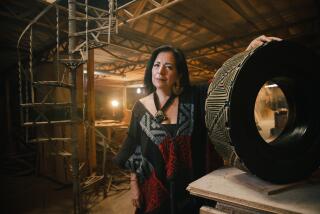Storybook Meeting in S.D. : Black artists: A Soviet choreographer is introduced to her American half-sisters during a meeting prompted by a black arts group in San Diego.
- Share via
SAN DIEGO — Monday morning, a thin, curly-haired man stood on the stage at the Educational Cultural Complex theater and passionately recited a poem, first in Russian and then in English.
The audience of students looked bemused as the poet’s foreign phrases filled the air, but they listened intently as he launched into the English translation of his tale of childhood memories.
Given the current preoccupation with things Soviet, this bilingual reading was not that unusual. But what was unusual was that the man was black and a citizen of the Soviet Union, and his poem included remembrances of lying in a cradle and “hearing Russian and African melodies.”
The poet is James Patterson, one of five black Soviets--three artists and two journalists, all children of black American fathers and Soviet mothers--who are in San Diego providing an intriguing and poignant addition to the Soviet arts festival.
The visit by the five was dreamed up by the local Organization of African American Artists and Writers, which some months back was seeking a way to include blacks in the festival. Members of the organization were in touch with a Howard University professor who is an expert on blacks in the Soviet Union.
“We wanted to let people know that there are people of African descent all over the world,” said Sylvia M’Lafi Thompson, cultural affairs officer at the Educational Cultural Complex and coordinator of the visit.
Thompson is leading the group around town for presentations at area schools and colleges. Thursday at 8 p.m. at the cultural complex in Southeast San Diego, there will be a final presentation called “Until We Meet Again.” The Soviet artists will perform along with pianist Cecil Lytle and other local black artists.
Black American students and agricultural experts were invited to the Soviet Union in the late ‘20s and early ‘30s to learn about socialist society. The theory was that they would return to the United States and
promote the the Soviet Union’s lack of racism.
A handful of the black visitors married Soviet women there and had families, four of which are represented in San Diego. (James Patterson’s brother, Tom, a television cameraman, is also among the visitors.)
At the Monday presentation, each of the visitors spoke and answered questions from the audience of students.
Yelena Khanga, a journalist with the Moscow News and the most English-fluent of the group, said little attention is paid to her background in the Soviet Union.
“Only when I’m interviewed by foreign journalists is (color) an issue.”
Eleanor Ross Johnson, a classical singer with the Moscow State Philharmony, speaks halting English, but the look on her face communicated her joy at being here.
The most touching story came from Margie Scott, a choreographer and former principal dancer with the Bolshoi Ballet, who just a few months ago discovered she had five half-sisters in the United States.
Her father, Henry Scott, went to the Soviet Union as a student in 1929. He became a well-known tap dancer and married a Moscow woman named Valentina Bobsena. They had a daughter named Ulemei, who came to be known as Margie.
Scott divorced Bobsena and married another Russian woman, Olga Larionova. They returned to the United States in 1939 and raised five daughters. When Scott died in 1945, his oldest American daughter was 7 years old, the youngest just an infant. As they grew up, the American-born children learned of their Soviet half-sister, but had no idea how to reach her. Margie Scott, the Russian ballerina with the unlikely name, didn’t even know she had an American family.
In May of 1988, one of the daughters, Nina Robinson was watching television in her New York home and happened to see photos of her father on a program produced by Essence magazine. There were also photos of a woman whose resemblance was unmistakable. It was Margie Scott, the long-lost relative.
Through a friend who traveled to the Soviet Union in March, the sisters were able to deliver a package to Scott, who responded with a letter bearing news that they have yet another Soviet sister, Yelena.
Robinson and two of her sisters, Scott Brown of New York City and Kirra Philpott of Mesa, Ariz., came to San Diego for the reunion. Saturday, the three sisters laid eyes on their Soviet half-sister for the first time.
“It’s been such an incredible story,” Brown said.
They are all incredible stories. James and Tom Patterson’s father, Lloyd, was born in New Jersey and graduated from Hampton College. He was a friend of Paul Robeson and other black artists.
Lloyd Patterson did not speak Russian, but he met a Soviet woman who spoke English. He learned Russian and became an announcer on Moscow Central Radio. He was killed in an explosion in 1942, leaving behind 8-year-old James and his younger brother, Tom.
Almost 20 years later, a package arrived at James’ Moscow home. It was a present--a book of poetry--from another one of his father’s friends. The dedication was addressed to “the dream keeper” and offered “good poetic wishes.”
It was from Langston Hughes.
More to Read
The biggest entertainment stories
Get our big stories about Hollywood, film, television, music, arts, culture and more right in your inbox as soon as they publish.
You may occasionally receive promotional content from the Los Angeles Times.










